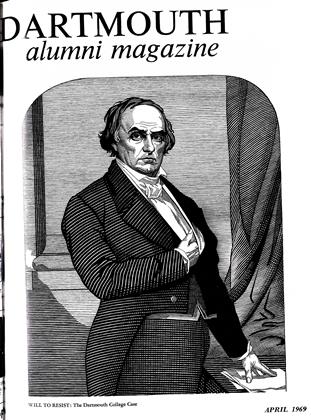THOUGH it was billed as a public critique of the Senior Symposia Winter Focus just ended, the discussion slipped off the rails into a freewheeling two-hour dialogue on how the College should be run. Professor of Chinese Jonathan Mirsky started the February 27 debate by asserting that Dartmouth intimidates students and faculty members who try to change administration policy. He told the audience of 70 that the College administration uses its reappointment power in the case of faculty and dismissal where students are involved to keep political activity at a minimum. "The system has the weapons at its disposal to take care of those who make trouble," he charged.
John W. Finch, chairman of the Drama Department and of the Humanities Division of the faculty, angrily denied Mirsky's allegations as "false and misleading." The only criterion for hiring or reappointing faculty members, he retorted, "is their competence as instructors."
As Finch listened aghast, undergraduates and young faculty members jumped into the fray, criticizing the College for making decisions in secret and for failing to appoint more students to faculty committees. Finch, completely unprepared for the verbal onslaught, could only reply lamely, "they influence decisions."
But by the middle of last month, many College administrators and senior faculty members had realized that answer won't do. While Students for a Democratic Society and other undergraduate radicals have concentrated their attacks on ROTC programs and military recruiting, a quite different group of students has been quietly applying the pressure for representation on faculty committees and a vote as well as a larger voice in determining College policy. And while many administrators still distrust "student power," there is a growing fear that failure of the moderate student reformers to get a piece of the action may result in a big boost for the radicals, who are interested in disruption and, ultimately, "destruction of the system."
On the Other Foot
It was quite a twist. Fumbling for a way to reverse a February CCSC decision which de facto abolished parietal regulations, the faculty's Executive Committee met for several hours with the College Committee but failed to budge four undergraduate CCSC members in their determination to stand by the decision.
The dispute arose when the CCSC, by a vote of the four students and one faculty member, decided not to punish parietal violators in the future. Fearing the action might bring down the wrath of state officialdom, the Executive Committee first "instructed" the CCSC to enforce all College regulations, and when that failed called a joint meeting to work out a compromise.
The meeting achieved no compromise. Instead, President Dickey promised the students the Executive Committee would not attempt to overrule the decision, and when the meeting had broken up several faculty members assured the undergraduates they would make a serious effort to seat students on more faculty committees. The biggest plum, of course, would be votes on the Executive Committee itself.
Dull, Duller ...
It was not the kind of protest Dartmouth has come to know. Instead of long hair and beards, there were well-cropped freshmen and a flock of "big greeners" standing on the Green and in front of Parkhurst chanting "Coeducation Now!" While a leader of the demonstration delivered a petition to President Dickey, his troops cheered and whistled at a rather startled young lady who happened to walk past the picket line. The signs were mostly facetious, and the protesters, in the words of at least one onlooker, "fatuous."
But the issue of coeducation is getting a hearing, by various student groups and by the Trustees, who have set up a panel to study, among other things, the advisability of admitting women. Meanwhile, sociology students were busy evaluating a scientific study of student attitudes, including coeducation, with the hope of getting a clearer picture of how College undergraduates really feel.
Encouraged by the coeducators' display, an ad hoc group was formed last month to protest the presence of a Reader's Digest recruiter on campus. A spokesman for the group, called Students Against Mental Enemas (SAME), explained that the organization considered the Digest "the strongest publication for the forces of mediocrity in the Western world." And sure enough, there in front of Fairbanks Hall, scene of the December obstruction of an army recruiter, the protesters held their "condensed demonstration," chanting "Dull, Duller, Digest!" and carrying tongue-in-cheek picket signs. It was all in fun, but it nevertheless shook the Digest, which is reportedly considering publicity to improve its public image among university students.
The Dartmouth Five, a student Dixieland band, took part last month in the Dartmouthon the Road" variety show that visited eight cities during spring recess todemonstrate educational and extracurricular programs at the College. Dean Seymour,master of ceremonies for the show, is at the wheel of his vintage Packard.
 View Full Issue
View Full Issue
More From This Issue
-
 Feature
FeatureWILL TO RESIST
April 1969 By RICHARD W. MORIN '24 -
 Feature
FeatureThe New Dean of the College...
April 1969 -
 Feature
FeatureCongress Authorizes National Medal
April 1969 -
 Class Notes
Class Notes1933
April 1969 By ERNEST S. DAVIS JR., WESLEY H. BEATTIE -
 Class Notes
Class Notes1930
April 1969 By CHARLES V. RAYMOND, G. WARREN FRENCH -
 Class Notes
Class Notes1955
April 1969 By JOSEPH D. MATHEWSON, RANDOLPH J. HAYES
CHRIS KERN '69
-
 Feature
FeatureVox Clamantis 1968
JUNE 1968 By Chris Kern '69 -
 Article
ArticleJUDICIARY REVISED
November 1968 By CHRIS KERN '69 -
 Article
ArticleThe Undergraduate Chair
DECEMBER 1968 By CHRIS KERN '69 -
 Article
ArticleThe Undergraduate Chair
MARCH 1969 By CHRIS KERN '69 -
 Article
ArticleThe Undergraduate Chair
MAY 1969 By CHRIS KERN '69 -
 Article
ArticleThe Undergraduate Chair
JUNE 1969 By CHRIS KERN '69








